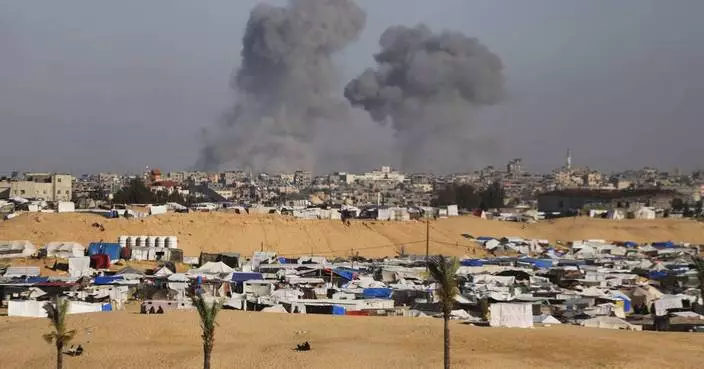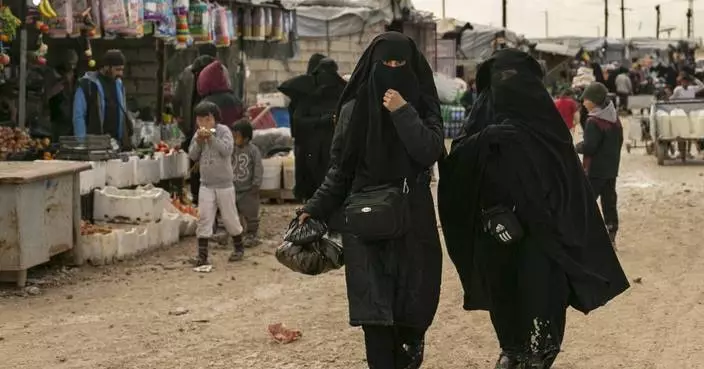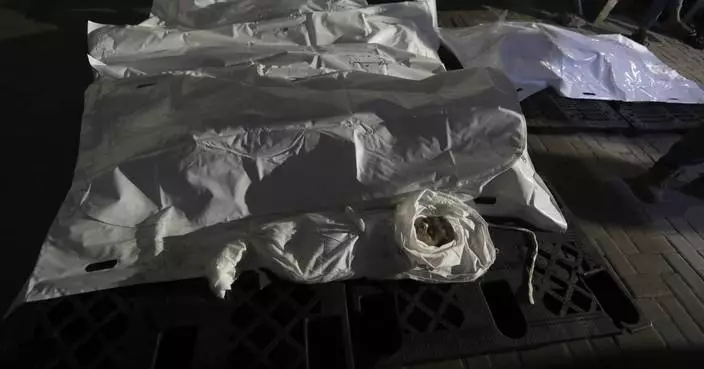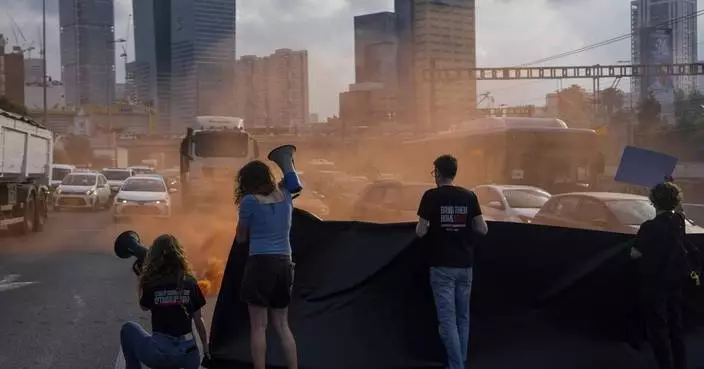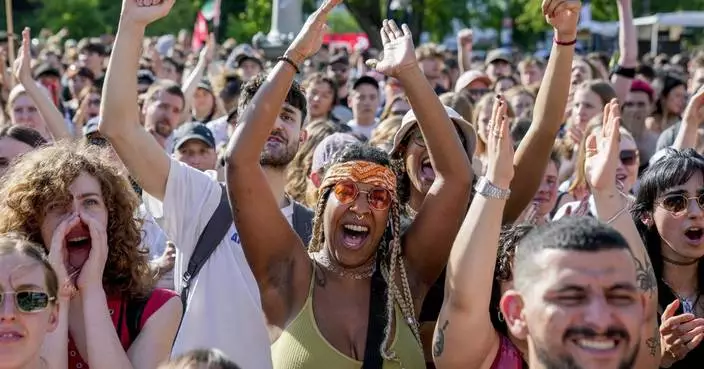A missile attack on government outposts in northern Syria killed more than a dozen pro-government fighters, many of them Iranians, a war monitoring group and an Iranian news agency said Monday. The strikes came amid soaring tensions between regional archenemies Israel and Iran.
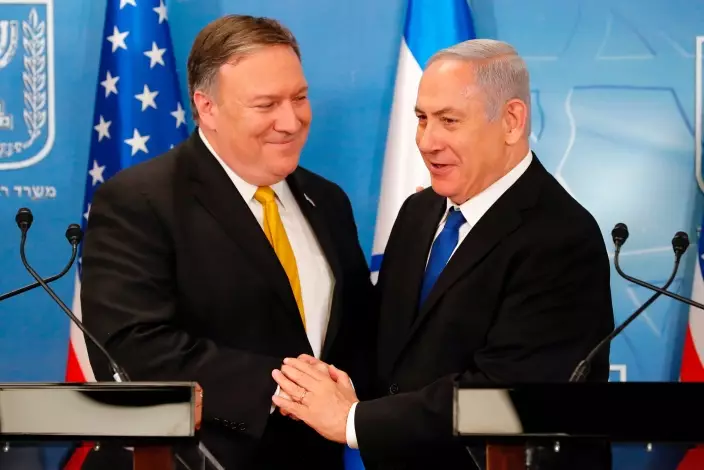
In this Sunday, April 29, 2018 file photo, U.S. Secretary of State Mike Pompeo. left. is greeted by Israeli Prime Minister Benjamin Netanyahu ahead of a press conference at the Ministry of Defense in Tel Aviv. (Thomas Coex, AFP via AP, File)
There was no official confirmation of the death toll or what was the target. The Sunday night strikes sparked speculation on who carried it out, with most reports suspecting Israel was behind it.
Syrian state TV called it a "new aggression on military positions" in Hama and Aleppo provinces but was not specific. Activists said there was a spectacular explosion at an arms depot and military compounds where Iranian fighters are based. The explosion was large enough to be picked up by monitors as a magnitude 2.6 earthquake.
The Syrian Observatory for Human Rights said 26 pro-government fighters were killed, most of them Iranians, with only four Syrians among the dead. It said the arms depot contained surface-to-surface missiles belonging to Iranian militias in Hama province. Another attack hit near a military air base in Aleppo province, the Observatory said.
It added that the death toll could rise, since 60 fighters were wounded and several others remained missing.
A member of an Iranian-backed Iraqi militia operating in Syria confirmed the attack on the Hama facility and put the death toll at 36, including 10 Iranian advisers. The official spoke on condition of anonymity because he was not authorized to talk to the media.
Iranian media gave conflicting reports: One semiofficial news agency said there were no Iranians killed, while a second one said 18 were killed.
The arms depot in Hama, known as Brigade 47, is one of the largest bases housing Iranian-affiliated forces and equipment, according to Jamil al-Saleh, commander in the opposition Tajammu al-Ezzat rebel group. He said the province has at least five other bases where Iranians are deployed alongside Syrian- allied militias.

In this photo released by the Syrian official news agency SANA, Syrian President Bashar Assad, right, meets with Alaeddin Boroujerdi, left, the head of Iran's parliamentary committee on national security and foreign policy, in Damascus, Syria, Monday, April 30, 2018. (SANA via AP)
The two airstrikes were near rebel areas, he added.
"It was like an earthquake hit Hama," al-Saleh said by telephone from Hama province. He and the Observatory said they suspect Israel was behind the attack.
Lebanon's Al-Akhbar daily, considered close to the militant Iranian-backed Hezbollah group and the Syrian government, said the attack targeted "important arms depots used by the (Syrian) army and Iran's Revolutionary Guards." It said the missiles used appear to have been bunker busters.
Syria-based opposition media activist Mohamad Rasheed said that base that came under attack is about 10 kilometers (7 miles) outside the city of Hama, adding that the airstrike led to several explosions in the arms depot. He added that the area is known as the Maarin Mountain or Mountain 47.
Some of the exploding missiles in the arms depot struck parts of Hama, Rasheed said, adding that residents near the base fled their homes. He said the base has been run by Iranian and Iran-backed fighters from Lebanon, Iraq, Afghanistan and Pakistan.
Tehran has sent thousands of fighters to Syria to support President Bashar Assad's forces in the seven-year civil war.
Following the attacks, Iran's Supreme Leader Ayatollah Ali Khamenei said the time when Tehran's enemies can "hit and run" is over, although he did not specifically refer to Sunday night's strikes.
"They know if they enter military conflict with Iran, they will be hit multiple times," he said in comments at a meeting with workers, according to his website.
There was no immediate comment from Israel, which rarely confirms or denies its attacks.
The attack came hours after Israeli Prime Minister Benjamin Netanyahu talked by phone with President Donald Trump. The White House said they discussed the threats and challenges facing the Middle East, "especially the problems posed by the Iranian regime's destabilizing activities."
U.S. Secretary of State Mike Pompeo ratcheted up the Trump administration's rhetoric against Iran and offered support to Israel and Saudi Arabia in their standoff with Tehran.
"We remain deeply concerned about Iran's dangerous escalation of threats to Israel and the region and Iran's ambition to dominate the Middle East remains," Pompeo said after meeting Sunday with Netanyahu during his first trip abroad as the top U.S. diplomat. "The United States is with Israel in this fight."
Israel has cited Iran's hostile rhetoric, support for anti-Israel militant groups and development of long-range missiles.
Iranian state TV reported the attack, citing Syrian media.
The semiofficial Iranian news agency Tasnim, believed to be close to the Revolutionary Guard, denied any Iranian fighters were killed or that Iranian-run bases were hit. It quoted an unidentified Iranian informed official in its report but did not elaborate.
Another semiofficial news agency, ISNA, said the strike killed 18 Iranians, including a commander, in a suburb of the central city of Hama. It cited "local sources and activists." ISNA said the missiles targeted buildings and centers that likely included a weapons depot.
The Syrian government-owned Tishrin newspaper quoted what it called "sources on the ground" as saying that the attack in Aleppo and Hama provinces consisted of nine ballistic missiles fired from U.S.-British bases in northern Jordan. The report could not be independently confirmed.
A member of one of the Iranian-backed militias posted on Facebook that the strikes have "hit our bases" where "allies" are also present. He didn't elaborate, but said Israel was suspected of being behind the attack.
"We have been expecting an Israeli message for some time now to ensnare Iran in a direct confrontation with Israel, on Syrian territories," Kamal Fayyadh, a Lebanese living in Syria, wrote on his Facebook page.
In a nationally televised speech, Netanyahu said Israel recently uncovered 55,000 documents and 183 CDs of information from Iran's "nuclear archives" proving the Tehran government once had a nuclear weapons program.
He said the documents show that Iran lied about its nuclear ambitions before signing a 2015 deal with world powers. Iran has denied ever seeking nuclear weapons.
Trump has set a May 12 deadline to decide whether to pull out of the Iran nuclear deal — something he appears likely to do despite heavy pressure to stay in from European and other parties.
Former Israeli military intelligence chief Amos Yadlin, who heads Tel Aviv University's Institute for National Security Studies, said Iran's robust military presence in Syria and Israel's determination to prevent it have put the two on a collision course at a time of tensions over the nuclear deal, Palestinian protests in Gaza and the expected U.S. Embassy move to Jerusalem.
Tensions between Iran and Israel were running high following an airstrike earlier this month on Syria's T4 air base in Homs province that killed seven Iranian military personnel. Tehran has vowed to retaliate for that attack.
Syria, Iran and Russia blamed Israel for that attack. Israel did not confirm or deny it.
Israel Defense Minister Avigdor Lieberman said in an interview published Thursday that his country will strike Iran if it attacks.
Gaza’s vital Rafah crossing remained closed early Wednesday after an Israeli tank brigade seized it the day before. Associated Press journalists heard sporadic explosions and gunfire in the area overnight, including two large blasts early Wednesday.
Rafah has been a vital conduit for humanitarian aid since the start of the war and is the only place where people can enter and exit. Israel now controls all of Gaza’s border crossings for the first time since it withdrew troops and settlers from the territory nearly two decades ago.
Gaza’s Health Ministry says at least 46 patients and wounded people who had been scheduled to leave Tuesday for medical treatment have been left stranded.
U.N. agencies and aid groups have ramped up humanitarian assistance in recent weeks as Israel has lifted some restrictions and opened an additional crossing in the north under pressure from the United States, its closest ally. But aid workers say the closure of Rafah, which is the only gateway for the entry of fuel for trucks and generators, could have severe repercussions.
The Israeli military said Wednesday it has reopened the Kerem Shalom crossing into Gaza, a key terminal for the entry of humanitarian aid that was closed over the weekend after a Hamas rocket attack killed four Israeli soldiers nearby.
The U.N. says northern Gaza is already in a state of “full-blown famine.”
The war in Gaza has driven around 80% of the territory's population of 2.3 million from their homes and caused vast destruction to apartments, hospitals, mosques and schools across several cities. The death toll in Gaza has soared to more than 34,500 people, according to local health officials.
The war began Oct. 7 when Hamas attacked southern Israel, killing around 1,200 people, mostly civilians, and abducting about 250 others. Israel says militants still hold around 100 hostages and the remains of more than 30 others.
Currently:
— US paused bomb shipment to Israel to signal concerns over Rafah invasion, official says.
— Israeli tanks have rolled into Rafah. What does this mean for the Palestinians sheltering there?
— Scenes from Israel and Gaza reflect dashed hopes as an imminent cease-fire seems unlikely.
— Israeli forces take control of the Gaza side of the Rafah crossing with Egypt.
— The U.N. says there’s ‘full-blown famine’ in northern Gaza. What does that mean?
Follow AP’s coverage of the war at https://apnews.com/hub/israel-hamas-war
Here's the latest:
JERUSALEM — Human Rights Watch has documented the deaths of eight Palestinians in the occupied West Bank who it says were killed by Israeli forces while posing no apparent threat.
The investigation published Wednesday found that Israeli forces “unlawfully used lethal force” against Palestinians in the volatile territory, where violence has surged since Hamas’ Oct. 7 attack triggered the ongoing war in Gaza.
Richard Weir, senior crisis and conflict researcher at the New York-based rights group, said the killing of Palestinians is “taking place at a level without recent precedent in an environment in which Israeli forces have no need to fear that their government will hold them accountable.”
The investigation examined four shootings of Palestinians from 2022 and 2023. Researchers interviewed witnesses and family members of the Palestinians, and conducted a review of news reports and videos of the shootings posted to social media.
Two of the four shootings occurred during Israeli raids into West Bank cities and towns, which the military says are aimed at rooting out militants. Rights groups say civilians and individuals posing no immediate threat have also been killed.
In one case, the investigation found, a Palestinian father and son were both shot dead by Israeli forces in the built-up Nur Shams refugee camp last October. Taha Matamid, 15, was shot as he stepped outside to look at the military jeeps encircling the camp, his sister told Human Rights Watch.
In a video taken by the sister and reviewed by The Associated Press, Taha does not appear to hold a weapon or pose a threat. Taha’s father, Ibrahim, was shot minutes later after running into the street to help his son — though the exact moment is not caught on camera. Later, Ibrahim can be seen in the video rolling around on the ground next to Taha.
Ambulances could not immediately reach the two, the U.N. later said, because Israeli vehicles were blocking entry to the camp. Ibrahim Matamid died from his wounds months later.
It is not clear whether the military has launched an investigation into the two deaths, and it did not respond to a request for comment.
Even when the military does investigate such cases, rights groups say soldiers are rarely punished, contributing to a culture of impunity in the territory, which Israel seized in the 1967 war and which the Palestinians want as the main part of their future state.
Palestinian health officials say nearly 500 Palestinians have been killed by Israeli fire in the West Bank since the start of the war in Gaza.
RAFAH, Gaza Strip — Gaza’s vital Rafah crossing remained closed early Wednesday after an Israeli tank brigade seized it the day before. Associated Press journalists heard sporadic explosions and gunfire in the area overnight, including two large blasts early Wednesday.
Rafah has been a vital conduit for humanitarian aid since the start of the war and is the only place where people can enter and exit. Israel now controls all of Gaza’s border crossings for the first time since it withdrew troops and settlers from the territory nearly two decades ago.
Gaza’s Health Ministry says at least 46 patients and wounded people who had been scheduled to leave for medical treatment have been left stranded.
U.N. agencies and aid groups have ramped up humanitarian assistance in recent weeks as Israel has lifted some restrictions and opened an additional crossing in the north under pressure from the United States, its closest ally. But aid workers say the closure of Rafah, which is the only gateway for the entry of fuel for trucks and generators, could have severe repercussions.
The U.N. says northern Gaza is already in a state of “full-blown famine.”
The operation to capture the crossing appears to have been a limited incursion and not the start of the massive invasion of Rafah that Israel has promised. But Israel has said it will expand the operation if ongoing indirect talks with Hamas over a cease-fire and hostage release fail to make progress.
The U.S. paused a shipment of bombs to Israel last week over concerns Israel was approaching a decision on launching a full-scale assault on the southern Gaza city of Rafah, a senior administration official said Tuesday.
The shipment was supposed to consist of 1,800 2,000-pound bombs and 1,700 500-pound bombs, according to the official, who spoke on the condition of anonymity to discuss the sensitive matter, with the focus of U.S. concern being the larger explosives and how they could be used in a dense urban setting. More than 1 million civilians are sheltering in Rafah after evacuating other parts of Gaza amid Israel’s war on Hamas, which came after the militant group’s deadly attack on Israel on Oct. 7.
President Joe Biden’s administration in April began reviewing future transfers of military assistance to Israel as Prime Minister Benjamin Netanyahu’s government appeared to move closer toward an invasion of Rafah, despite months of opposition from the White House.
The official said the decision to pause the shipment was made last week and no final decision had been made yet on whether to proceed with the shipment at a later date.
— By ZEKE MILLER and AAMER MADHANI in Washington
WASHINGTON — The U.S. military has finished construction of a temporary pier and causeway that will be used to deliver aid to Gaza through a maritime system, but plans to move it into place on the shore are on hold due to weather and other logistics.
Sabrina Singh, a Pentagon spokeswoman, told reporters on Tuesday that U.S. military ships and the assembled pier are at Israel’s Ashdod port. High winds and sea swells are making it too dangerous for the U.S. military to install the pier at the Gaza beach.
Singh says the U.S. hopes to install the pier and causeway later this week, if the weather permits.
Meanwhile, humanitarian aid is being loaded onto a large container ship, the Sagamore, in Cyprus, for eventual delivery to Gaza, Singh said.
The U.S. hopes the pier can be used to bring more humanitarian aid into Gaza, where the U.N. says there is a full-blown famine in the north.
UNITED NATIONS — Critical diesel fuel to pump drinking water, maintain communications and deliver aid in Gaza will run out Wednesday and it’s estimated that food already in the south will be gone by the end of the week, a senior U.N. humanitarian said following Israel’s closure of the two key crossing points into the territory.
Andrea De Domenico, the head of the U.N.’s humanitarian office in the Palestinian territories, said Tuesday that Israel’s military operation and evacuation order in Rafah has resulted in “the forced displacement of tens of thousands of people.”
The area Israel told Palestinians to go is mainly sand dunes and has no latrines, water points, drainage, shelter or health facilities, De Domenico said in a virtual news conference from Jerusalem.
The Israelis are not on the ground providing services and are looking for humanitarian partners, he said. And it is impossible to improve conditions without the arrival of supplies and fuel to transport them to the new locations.
Without fuel and more flour, he said, the 16 bakeries supported by the U.N. World Food Program throughout Gaza will be forced to suspend operations. If supplemental nutrition supplies can’t be delivered, the treatment of more than 3,000 children suffering from acute malnutrition will be interrupted, he said, and three of the main remaining hospitals “will become inoperable.”
De Domenico said the U.N. normally uses 200,000 liters of diesel fuel a day in Gaza. As of Tuesday night, it had 30,000 liters left.
Without a fuel delivery on Wednesday, he said, the main water production facility in the north will be shut, “depriving the entire population of access to drinking water.” The same shutdown will happen in another day for the middle and south of Gaza, impacting 1.9 million people.
“The reality is that we are confronting a situation where we have probably one of the least resilient populations in Gaza because of the seven months of war in one of the most violent and lethal conflicts that we have seen in recent years,” he said.
De Domenico said there is a risk that no humanitarian assistance will be available in the coming days unless a way can be found to bring in and sustain aid deliveries.
The Israelis have assured the U.N. they are working on ways to bring in more fuel, hopefully on Wednesday, he said, and they said they hope to reopen the crossings rapidly, but didn’t give a timeline.
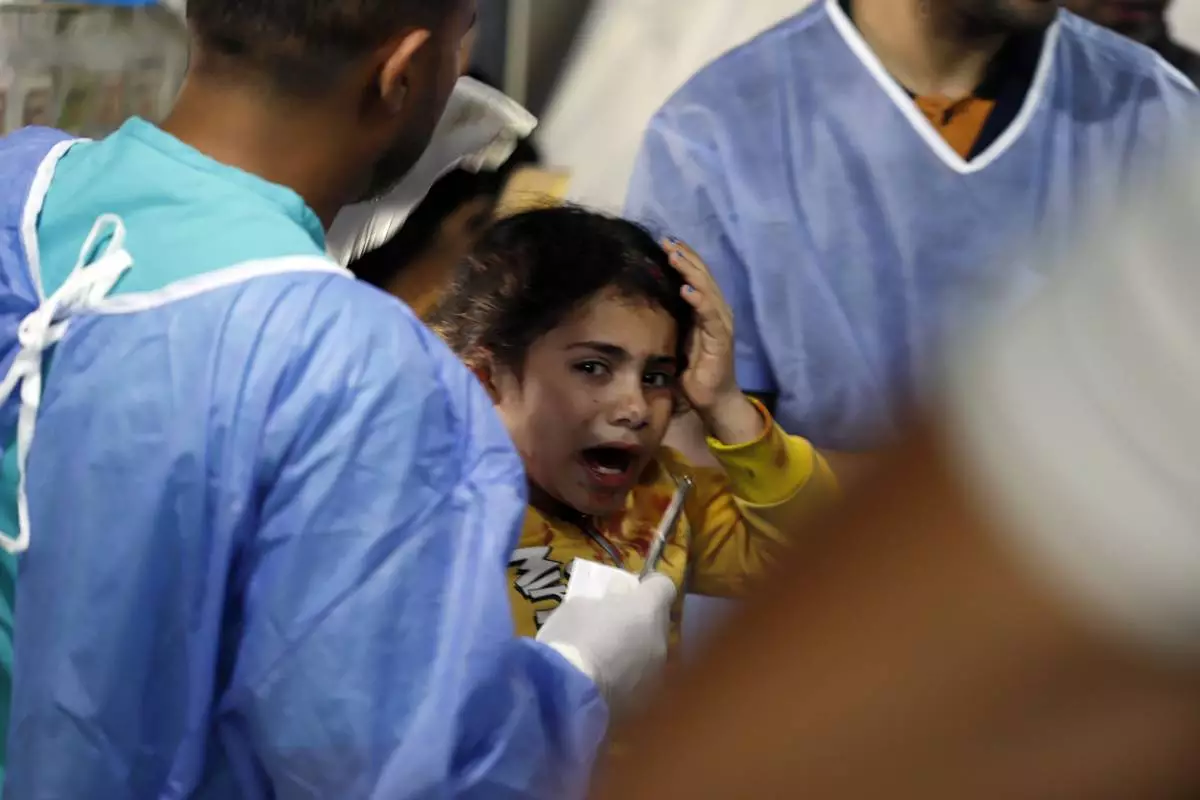
Palestinian medics treat a girl wounded in the Israeli bombardment of the Gaza Strip at the Kuwaiti Hospital in Rafah refugee camp, southern Gaza, Tuesday, May 7, 2024. (AP Photo/Ramez Habboub)
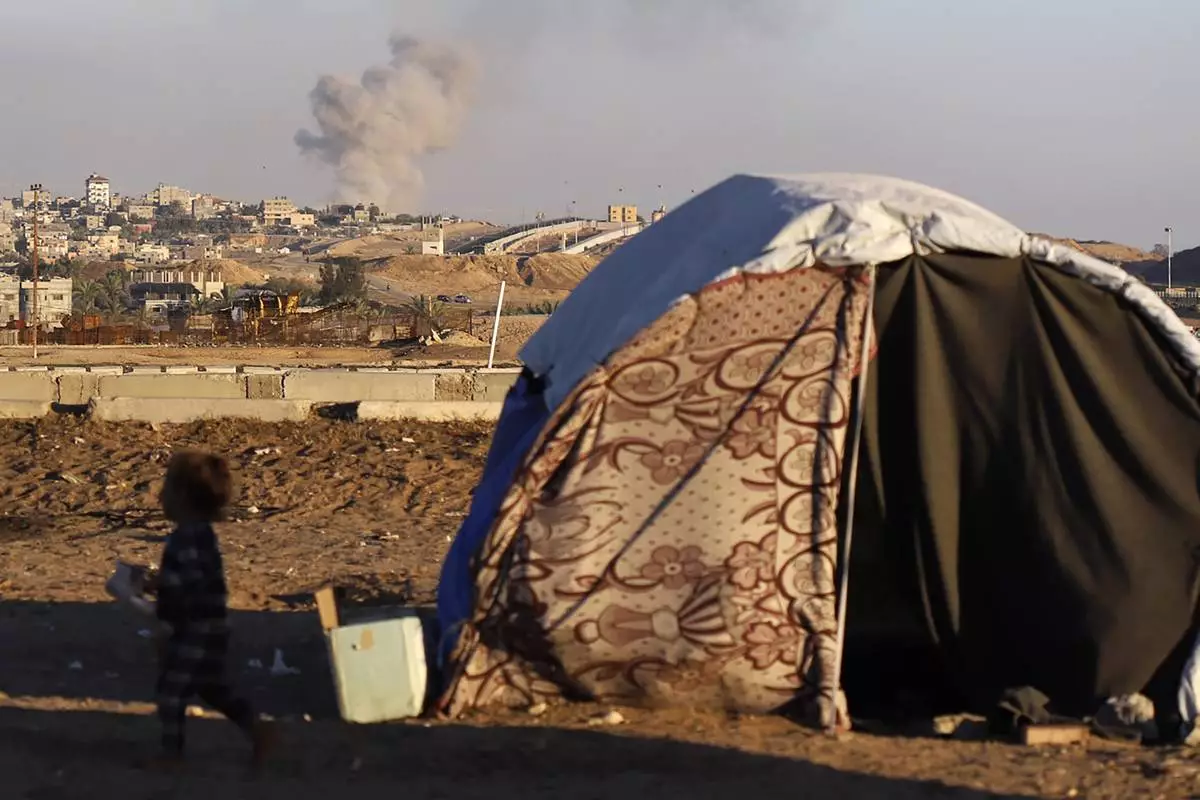
Smoke rises following an Israeli airstrike on buildings near the separating wall between Egypt and Rafah, southern Gaza Strip, Tuesday, May 7, 2024. (AP Photo/Ramez Habboub)
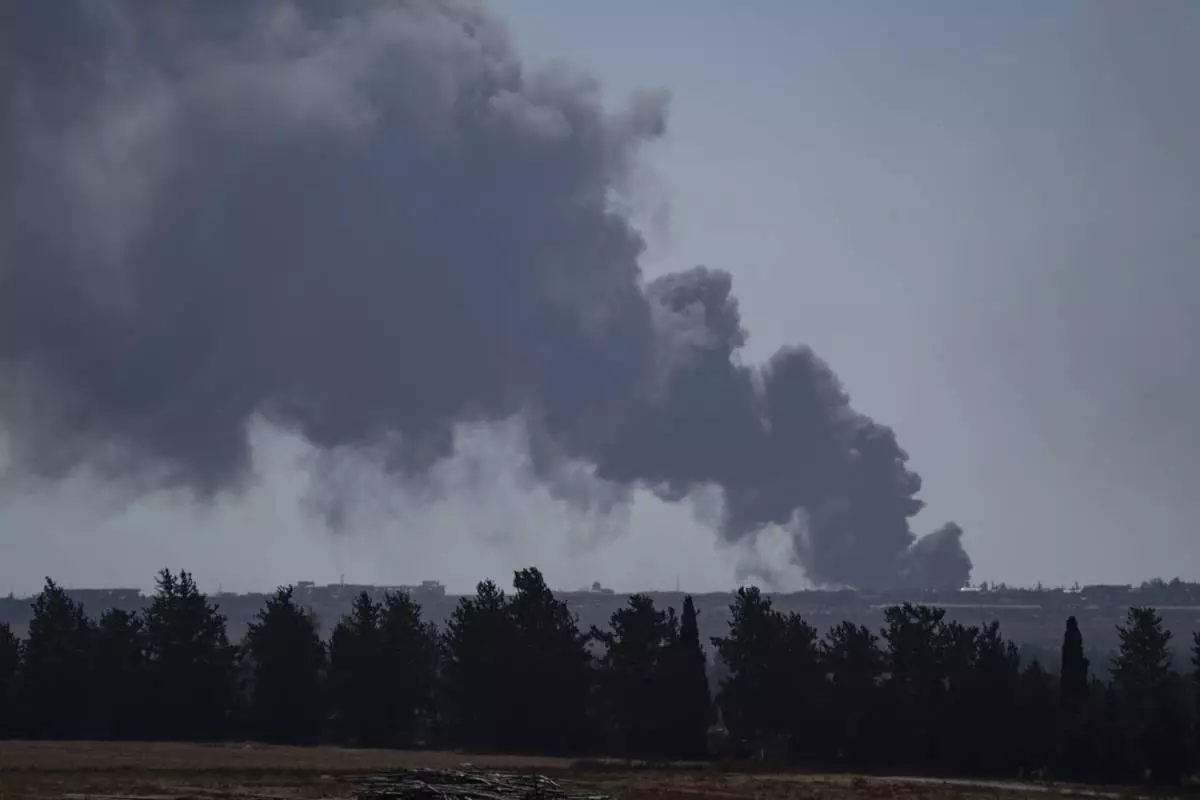
Smoke rises following an Israeli bombardment in the Gaza Strip as seen from southern Israel, Tuesday, May 7, 2024. (AP Photo/Leo Correa)
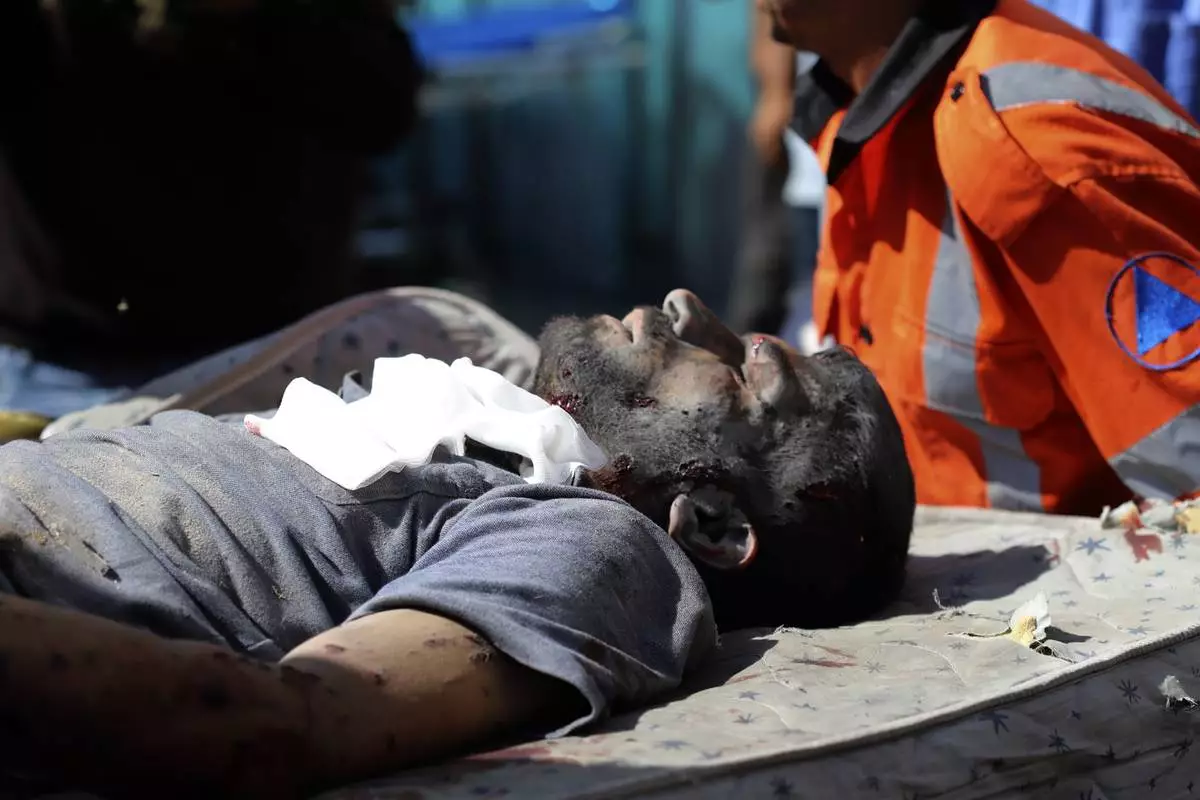
A Palestinian man who was seriously wounded in the Israeli bombardment of the Gaza Strip is brought to the Kuwaiti Hospital in Rafah refugee camp, southern Gaza, Tuesday, May 7, 2024. (AP Photo/Ramez Habboub
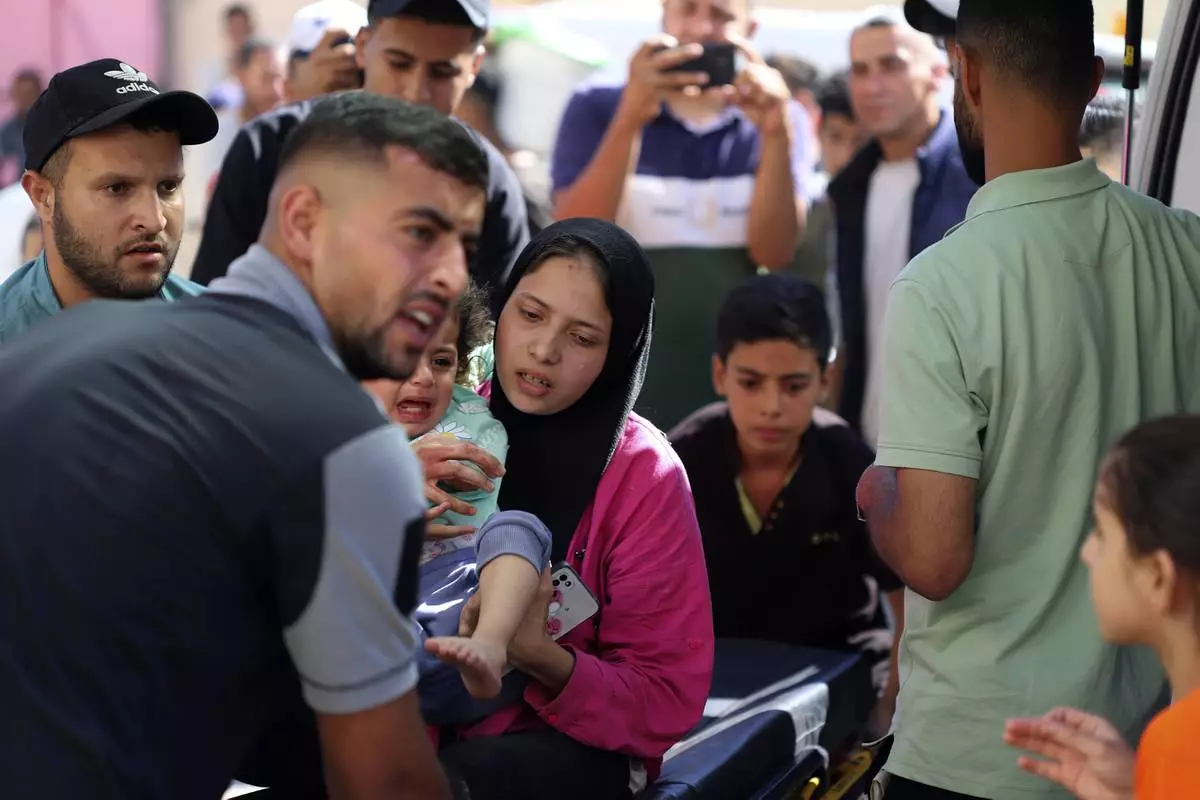
A Palestinian child is brought to the Kuwaiti Hospital after being wounded in the Israeli bombardment of the Gaza Strip, in Rafah refugee camp, southern Gaza, Tuesday, May 7, 2024. (AP Photo/Ramez Habboub)
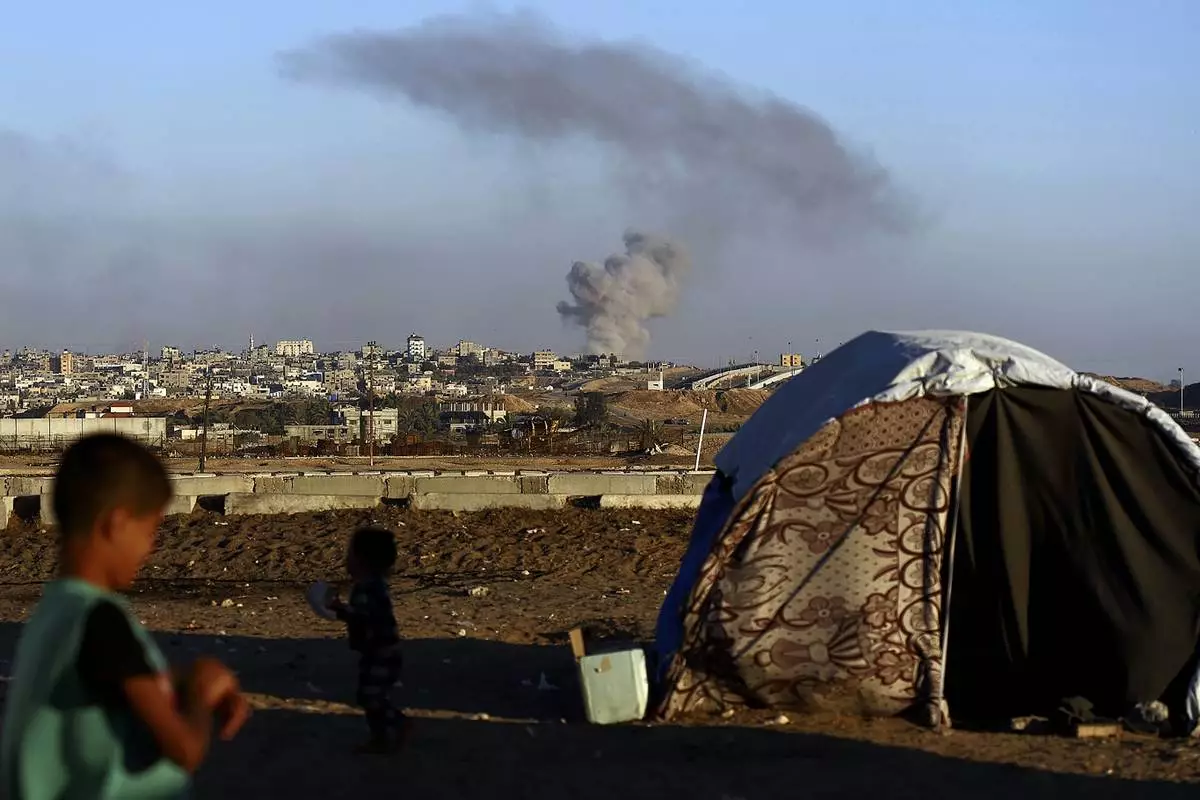
Smoke rises following an Israeli airstrike on buildings near the separating wall between Egypt and Rafah, southern Gaza Strip, Tuesday, May 7, 2024. (AP Photo/Ramez Habboub)

Palestinian medics treat a girl that was wounded in the Israeli bombardment of the Gaza Strip at the Kuwaiti Hospital in Rafah refugee camp, southern Gaza, Tuesday, May 7, 2024. (AP Photo/Ramez Habboub)
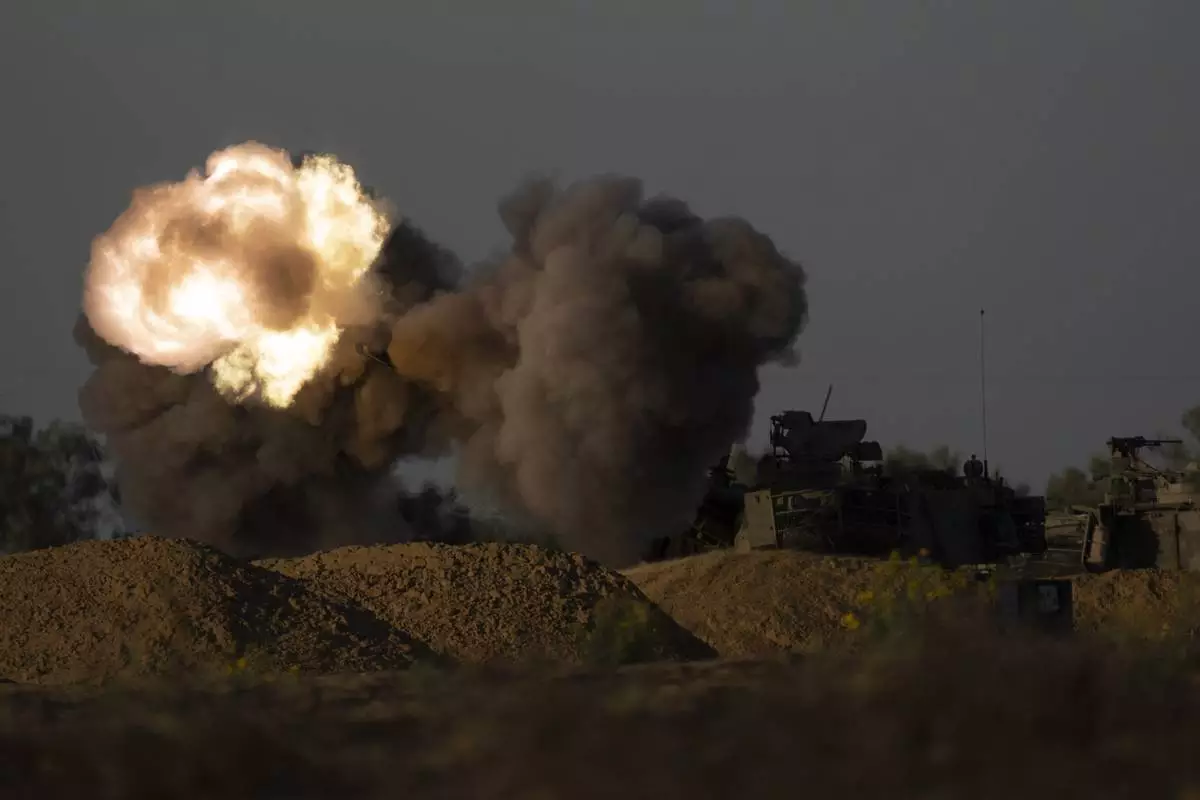
An Israeli mobile artillery unit fires a shell from southern Israel towards the Gaza Strip, in a position near the Israel-Gaza border, Tuesday, May 7, 2024. (AP Photo/Leo Correa)
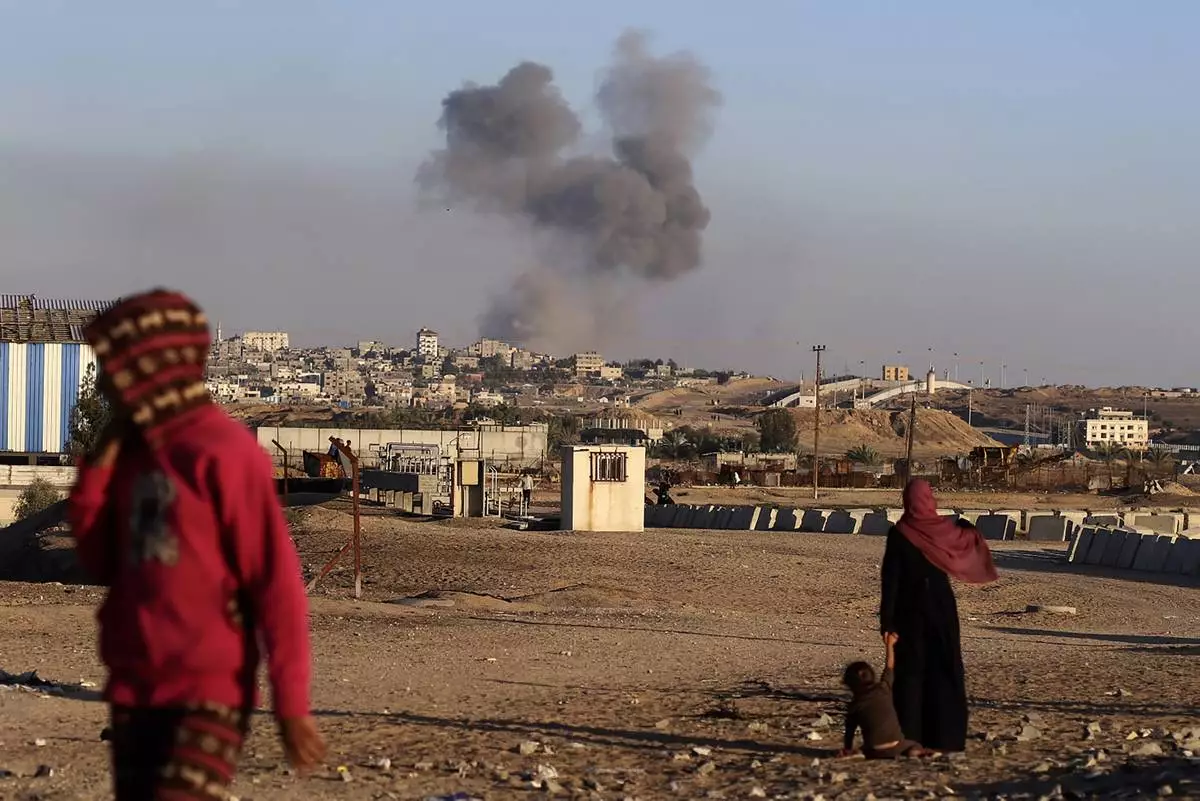
Smoke rises following an Israeli airstrike on buildings near the separating wall between Egypt and Rafah, southern Gaza Strip, Tuesday, May 7, 2024. (AP Photo/Ramez Habboub)














